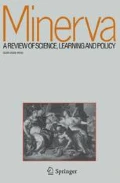Abstract
In the immediate post-Sputnik era, the member governments of theAtlantic community were deeply concerned about the growingquantity and quality of scientists and engineers in the SovietUnion, which threatened to outstrip the supply of manpower in theUnited States and Western Europe. One of the main tasks of theNATO Science Committee, formally established in December 1957,was to redress this educational imbalance. Its preferredinstruments were international scientific exchange and trainingin fields of basic science. This paper charts the actionsundertaken by this committee to strengthen Western science,exploring its achievements, and analysing why it failed to couplethe research it supported to the interests of the defenceestablishment.
Similar content being viewed by others
Rights and permissions
About this article
Cite this article
Krige, J. NATO and the Strengthening of Western Science in the Post-Sputnik Era. Minerva 38, 81–108 (2000). https://doi.org/10.1023/A:1026549723657
Issue Date:
DOI: https://doi.org/10.1023/A:1026549723657




